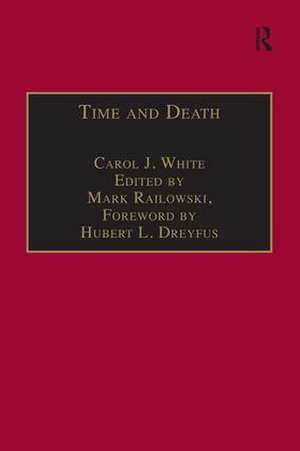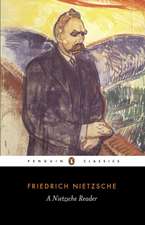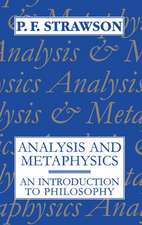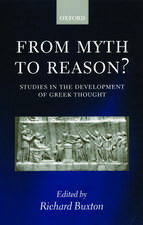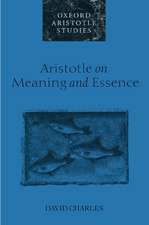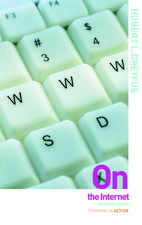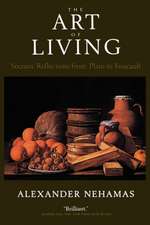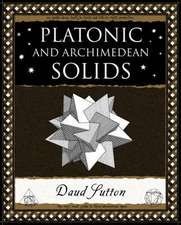Time and Death: Heidegger's Analysis of Finitude: Intersections: Continental and Analytic Philosophy
Autor Carol J. White, edited by Mark Ralkowskien Limba Engleză Paperback – 28 noi 2016
| Toate formatele și edițiile | Preț | Express |
|---|---|---|
| Paperback (1) | 469.34 lei 6-8 săpt. | |
| Taylor & Francis – 28 noi 2016 | 469.34 lei 6-8 săpt. | |
| Hardback (1) | 736.38 lei 6-8 săpt. | |
| Taylor & Francis – 17 feb 2005 | 736.38 lei 6-8 săpt. |
Preț: 469.34 lei
Nou
Puncte Express: 704
Preț estimativ în valută:
89.81€ • 93.96$ • 74.60£
89.81€ • 93.96$ • 74.60£
Carte tipărită la comandă
Livrare economică 02-16 aprilie
Preluare comenzi: 021 569.72.76
Specificații
ISBN-13: 9781138277694
ISBN-10: 113827769X
Pagini: 232
Dimensiuni: 156 x 234 x 12 mm
Greutate: 0.45 kg
Ediția:1
Editura: Taylor & Francis
Colecția Routledge
Seria Intersections: Continental and Analytic Philosophy
Locul publicării:Oxford, United Kingdom
ISBN-10: 113827769X
Pagini: 232
Dimensiuni: 156 x 234 x 12 mm
Greutate: 0.45 kg
Ediția:1
Editura: Taylor & Francis
Colecția Routledge
Seria Intersections: Continental and Analytic Philosophy
Locul publicării:Oxford, United Kingdom
Cuprins
Contents: Foreword, Hubert L. Dreyfus; Editor's preface; Heidegger's texts and translations; Author's preface; Introduction; The existential analysis; The death of Dasein; The timeliness of Dasein; The derivation of time; The time of being; Bibliography; Index.
Notă biografică
Carol J. White was formerly Associate Professor of Philosophy at Santa Clara University, USA. Mark Ralkowski is a graduate student at University of New Mexico, USA.
Recenzii
'Carol J. White's work has a natural cadence and a clarity of expression which makes the philosophical questions being dealt with come alive and appear seductively clear. Such is the richness of the intellectual world she weaves that insights abound yet come in and out of focus as the philosophical terrain shifts... It open us culture and processes of social ordering to a deepened understanding of the interplay between action and presence.' Journal of Futures Studies 'Carol White's Time and Death: Heidegger's Analysis of Finitude is a book rich in thought, dense in original interpretive claims, and overflowing with supporting textual references.' Inquiry 'Carol White’s book probably stands as the most scholarly publication on Heidegger’s analysis of death that is currently available. Including an indispensable foreword to the book, the noted Heidegger scholar, Hubert Dreyfus, identifies no less than eight positions on death and dying that various philosophers read into the relevant sections of Being and Time, concisely illuminating the arguments and counter-arguments for each stance. This provides us with a context for this publication, but it is also used as a testament to the towering contribution made by White, since Dreyfus argues that her position is the most compelling interpretation of Heidegger’s account on death, based not just on the philosopher’s earlier work, but consistent with writings produced throughout his life... White uncompromisingly explores the ideas behind the terms (or jargon, if you prefer), leaving the reader with a significantly richer and more coherent understanding of Heidegger’s overall project, and, I might add, an appreciation of the crucial importance of finitude in the corpus of his thought as a whole.' Existential Analysis
Descriere
In Time and Death Carol White articulates a vision of Martin Heidegger's work which grows out of a new understanding of what he was trying to address in his discussion of death. Acknowledging that the discussion of this issue in Heidegger's major work Being and Time is often far from clear, White presents a new interpretation of Heidegger which short-circuits many of the traditional criticisms. Placing the problems with which Heidegger is dealing in the context of issues in contemporary Anglo-American philosophy in order to better locate him for the more mainstream audience, White's language and approach is able to accommodate the novice but also offers much food for thought for the Heidegger scholar.
